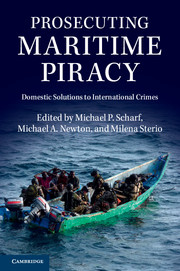Book contents
- Frontmatter
- Contents
- Contributors
- Introduction
- PART I DEFINING THE CRIME OF PIRACY AND ESTABLISHING JURISDICTION OVER THE CRIME OF PIRACY
- 1 The Governing International Law on Maritime Piracy
- 2 The Incorporation of International Law to Define Piracy Crimes, National Laws, and the Definition of Piracy
- 3 Exercising Universal Jurisdiction over Piracy
- 4 Incorporating International Law to Establish Jurisdiction over Piracy Offenses: A Comparative Examination of the Laws of the Netherlands, South Korea, Tanzania, India, and Kenya
- PART II THE PURSUIT, ARREST, AND PRE-TRIAL TREATMENT OF PIRATES
- PART III LEGAL ISSUES IN DOMESTIC PIRATE TRIALS
- PART IV SENTENCING AND POST-SENTENCE TREATMENT OF CONVICTED PIRATES
- Conclusion: Is There a Case for an International Piracy Court?
- Index
1 - The Governing International Law on Maritime Piracy
from PART I - DEFINING THE CRIME OF PIRACY AND ESTABLISHING JURISDICTION OVER THE CRIME OF PIRACY
Published online by Cambridge University Press: 05 June 2015
- Frontmatter
- Contents
- Contributors
- Introduction
- PART I DEFINING THE CRIME OF PIRACY AND ESTABLISHING JURISDICTION OVER THE CRIME OF PIRACY
- 1 The Governing International Law on Maritime Piracy
- 2 The Incorporation of International Law to Define Piracy Crimes, National Laws, and the Definition of Piracy
- 3 Exercising Universal Jurisdiction over Piracy
- 4 Incorporating International Law to Establish Jurisdiction over Piracy Offenses: A Comparative Examination of the Laws of the Netherlands, South Korea, Tanzania, India, and Kenya
- PART II THE PURSUIT, ARREST, AND PRE-TRIAL TREATMENT OF PIRATES
- PART III LEGAL ISSUES IN DOMESTIC PIRATE TRIALS
- PART IV SENTENCING AND POST-SENTENCE TREATMENT OF CONVICTED PIRATES
- Conclusion: Is There a Case for an International Piracy Court?
- Index
Summary
INTRODUCTION
Although piracy is an age-old crime, it has reemerged in recent years off the coast of Somalia, in the Gulf of Guinea, and in the international straits of Indonesia. Global acts of piracy rose quickly first off the coast of Somalia from 2008 to 2011, and they are now growing steadily off the east coast of Africa in the Gulf of Guinea, Indonesia, and Malaysia, among other places. Somali piracy appears to be on the decline, perhaps in large part because of the effectiveness of international efforts to combat piracy; however, global piracy continues to pose challenges for the international shipping industry, coastal states, and seafarers worldwide. The international community has addressed the rise in piracy through the increased use of maritime patrols by international naval forces, the industry's development of “Best Management Practices” (BMPs) for preventing piracy attacks, the increased use of armed security personnel on board ships, and an increase in international prosecutions for the crime of piracy. Each of these initiatives has brought about some success in addressing the piracy concern; however, most important for the purposes of this chapter is the increase in international prosecutions for the crime of piracy.
Between 2008 and 2012 alone, more than 1,000 pirates were brought to justice in 20 different countries. Many of these prosecutions were unique, and each was based on the laws in place in the jurisdiction handling the prosecution. In some cases, suspected pirates were freed over the lack of appropriate laws governing acts of piracy, whereas in others, different judges interpreted their own municipal laws differently, thereby causing some inconsistency in the outcomes of these cases. Sentences also varied based on the laws in place in the prosecuting country.
Prosecutions in the respective jurisdictions were based on the domestic incorporation or use of the customary international law on piracy, the United Nations Convention on the Law of the Sea (UNCLOS), or on the Convention for the Suppression of Unlawful Acts against the Safety of Maritime Navigation (SUA).
- Type
- Chapter
- Information
- Prosecuting Maritime PiracyDomestic Solutions to International Crimes, pp. 13 - 31Publisher: Cambridge University PressPrint publication year: 2015
- 1
- Cited by



